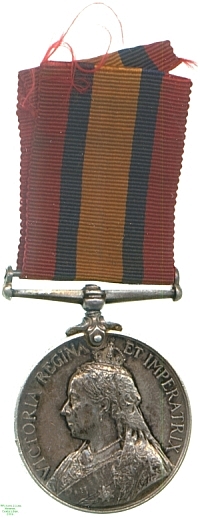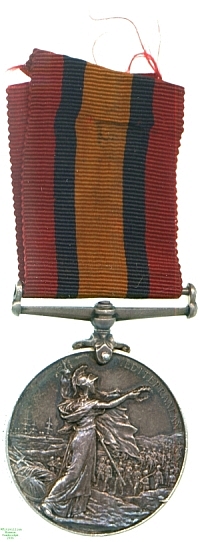
Obverse, a bust of Queen Victoria with veil

Reverse, Britannia in the foreground facing right holding a standard and waving a wreath over an army marching along the shore, with ships offshore in the background

Obverse, a bust of Queen Victoria with veil |

Reverse, Britannia in the foreground facing right holding a standard and waving a wreath over an army marching along the shore, with ships offshore in the background |
During the 1830s and 1840s several Dutch republics had been established outside the British Cape Colony in South Africa, among which were Transvaal and the Orange Free State, all now in modern South Africa. Transvaal was annexed briefly by the British but its independence re-established in the First Boer War.
In the 1880s however the discovery of vast gold reserves in Transvaal brought large numbers of foreign settlers, largely British, across the border, and an attempted coup at the instigation of Cecil Rhodes in 1895. Military escalation followed, negotiations failed and the two Boer republics, convinced that the British intended annexation, declared war on the Cape Colony in October 1899.
The war required regular army forces to be supplied from wherever possible, but this left the garrisons whence they came dangerously short. The slack was taken up by men of the Militia who volunteered for service abroad, and who in some cases were sent to supply these garrisons with manpower while their regular troops fought in South Africa.
In 1902 this medal was awarded to such volunteers who had served in the garrisons at Gibraltar, Malta and Egypt during the Boer campaigns, where they were often put to guarding Boer prisoners. Queen Victoria had died during the fighting, but her portrait was retained on this medal, which is likewise known as the Queen's Mediterranean Medal although it was authorised by King Edward VII.
This example was awarded to Corporal S. Froggatt of the West Yorkshire Regiment. Lester Watson acquired the medal at some point before 1928.